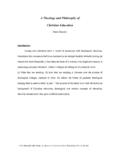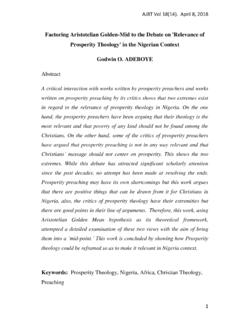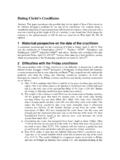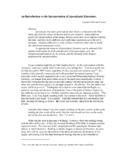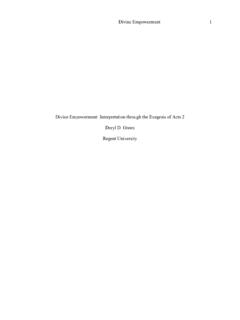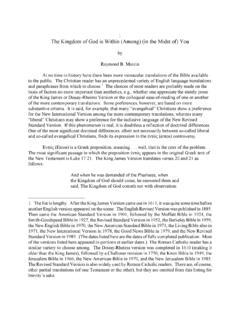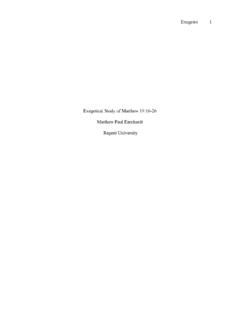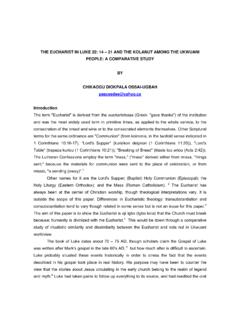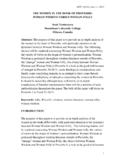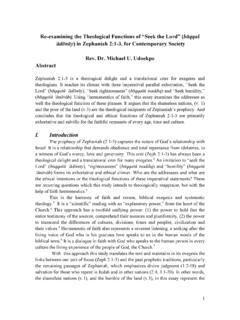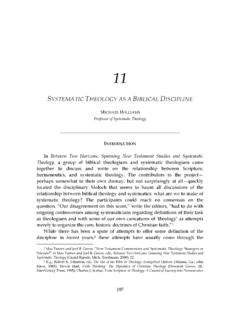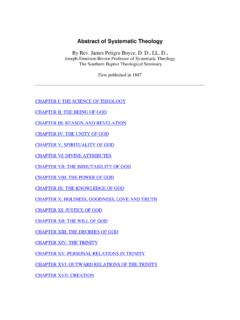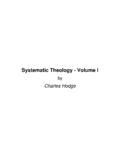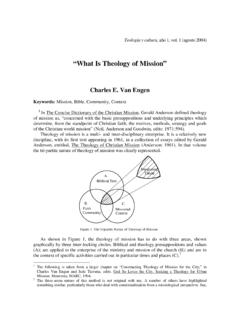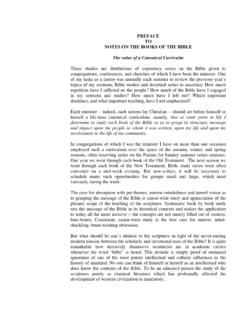Transcription of PAUL’S CONCEPT OF LAW AND GRACE AND ITS …
1 PAUL'S CONCEPT OF LAW AND GRACE AND ITS relevance FOR. THE church today . Olugbenga Samuel Olagungu, ABSTRACT. This paper is to provide a conceptual analysis of Paul's teaching on the law and GRACE in light of the salvation brought by Jesus the Christ and their relevance for today . The method adopted for writing this paper is hermeneutical analysis of Paul's view of law and GRACE in Romans which involves historical-critical method and application. This paper is limited in scope to selected passages in Romans 1-8. Internet sources, commentaries and textbooks on Paul's Epistle to Romans and journal articles are employed in the course of writing this paper. The writer discusses Paul's view of the law and covenant, his view of GRACE and salvation and his view about Christ's freedom from the law through GRACE and the relevance of this interpretation for Christians today .
2 The paper is divided into four sections. Section one discusses the authors and his world, which has to do with the world of Paul. Section two discusses contextual matter in the text that involves Paul's view about the law, GRACE and salvation. Section three discusses the reader's world while the final section discusses the relevance of law and GRACE for the church . INTRODUCTION. The decree issued by Claudius in 49 had affected Christian Jews living in Rome. This edict was enacted to banish all Jews from Rome to N T Wright notes that many of the Christians who were left would undoubtedly have been erstwhile God-fearers or Unlike the Galatians church , these Gentile Christians were not eager to keep the Jewish law, but would be inclined, not least from social pressures within pagan Rome, to distance themselves from it, and to use the opportunity of Claudius's decree to articulate their identity in non-Jewish 1.
3 N. T. Wright Romans and the theology of Paul' published in Pauline theology, volume iii, ed. David m. Hay & E. Elizabeth Johnson, 1995, 30 67. Minneapolis: Fortress, 1995. 2. Wright He notes that when the Jews returned to Rome in 54 CE upon Claudius's death, one may assume that the (Gentile) church leadership would not exactly be delirious with Naturally the coming back of the Jews to Rome would create some tension between the Gentile Christians and the returning Jewish Christians who were already fanatical about the law and The Jews have the law and the covenant and it would be difficult to sit with the Gentile to fellowship. So, already a dichotomy has been created between the Jews and the This is a challenge which Paul sought to address in Romans.
4 Paul was tactful in his writing to the Christian Jews in Rome. He was not their Apostle; he sought recognition among them, so that his ministry can be acceptable and at the same time use Rome as his missionary Wright notes Paul intention was to use Rome as his base of operations in the western Mediterranean, as he had used Antioch for the eastern Mediterranean. Antioch had, certainly on one occasion and possibly thereafter, virtually stabbed him in the back, undermining the theological foundation of his mission by insisting on the continuing separation of Jews and Gentiles within the Christian fellowship.' 8. The so-called Antioch incident of Galatians 2 reflects Paul's opposition to any sense that Jewish Christians are superior to Gentile Mattila notes that the law that Paul discusses in Romans is Judaic law and is comprised of rules of conduct communicated by God to Moses and Abraham in the Old Paul was not discussing the Roman laws nor was he discussing the laws in the Graeco-Roman world?
5 What he was discussing is the law; Moses received on Mount Sinai in the wilderness. The law comprises of two aspects the rituals and the covenant. The rituals have to do with the cultus and ceremony while the covenant has to do with the moral code. These laws include 3. Wright 4. Wright 5. James Dunn Paul and His World 6. Dunn 7. Dunn 8. Wright 9. John Stott. The Message of Romans 10. Mattila regulations regarding actions, circumcision, food laws, and worship11. In Paul's view, when a man is obedient to God's law he is righteous in God's sight. Abraham was righteous in God's sight because of his obedience to the The law is very stringent and inevitably every person falls short of the expectations of God's law.
6 The law considers human being's imperfection and prescribes only one punishment for sin and that is death. II. PAUL'S VIEW OF THE LAW AND COVENANT. Paul's view of the Law is probably one of the most debated topics in Pauline studies. 13. Daniel Wallace notes that the problems and apparent contradictions in Paul's View of the Law are diverse. 14 Some commentators believe that Paul changed his view of the Law considerably between writing Galatians and Romans. However, a careful analysis of Paul's statements about the Law in both letters will show that they are complementary, not There are no contradictions in Paul's view about the law, Paul was writing to two different audiences.
7 He has to employ different strategies to meet the needs of the people he was writing to. The church in Galatia comprises majorly of the Gentiles with Jewish infiltration while the church at Rome was basically Jewish Christians congregation. Paul had to be tactful in his writing to the Romans so that his apostleship can be recognized by the church . That was not the case with the Galatians church . His speech and letter to the Galatians was sharp and straight forward because they were the zeal of his apostleship. This was not the case with the Romans. It was customary for Paul to react differently in various circumstances he found himself. F. Thielman citing Sanders notes that Paul had no theology of the Law but merely responded in various ways to various circumstances which threatened his mission to the Jews and Gentiles.
8 This is why he proclaimed the necessity of participation in Christ for However, Paul's view about 11. Dunn Commentary on Romans' 2011. 12. Matila 13. K. Snodgrass, Spheres of Influence: A Possible Solution to the Problem of Paul and the Law ,Journal for the Study of the New Testament 32 (1988) 9. 14. Daniel Wallace Galatians 3:19-20: A Crux Interpretum for Paul's View of the Law, . WestminsterTheological Journal 52 (Fall 1990) 225. 15. Andrew Kulikovsky, Paul's View of the Law in Galatians and Romans' online pdf June 30, 1999 Accessed July 23, 2011. 16. Rogers Bowen. Guide to Romans (London: SPCK, 1975), 22ff the Law in Romans and Galatians are not formal, systematic discussion but an ad hoc documents dealing with specific pastoral Nowhere in the New Testament is there a complete discussion, so, all we can do is to make extrapolations from whatever Paul says in his corpus.
9 In Gen 12: 1-7;15:1-15; 17:1-8 God made covenant with Abraham that he would give him an inheritance that would be everlasting and that the land in which he lives now would become his. Therefore, the Jew's inheritance was based on God's promise, not on the Law (cf. Gal 3:15-18). Andrew notes that God's covenant with Abraham was based on faith and was not set aside or supplemented by the Law. Indeed, the Law was not issued until 430 years after the Abrahamic covenant was established (Gal 3:17). Paul reiterated this point in Romans 4:13-14, that the law did not come through the Law but through righteousness of The Jews were already claiming that their religion and knowledge of the law made them superior than any other ethnic group in Romans 2:17-24.
10 This boasting here is most probably the belief that ethnic Israel is inalienably the people of the one true God and that her possession of the law, quite irrespective of her keeping of it, demonstrates this fact. 19 Paul, however, took them to task and exposed their ignorance. It is clear that the series of rhetorical questions in vv. 21-23 require negative answers. Despite their knowledge of the Law, the Jews still broke it, and God's name is blasphemed among the Gentiles because of it (v. 24). Hayes notes that knowledge of the Law is of no value unless it is accompanied by obedience. Thus, the offence which the Jews have committed is the breaking of the Law.
